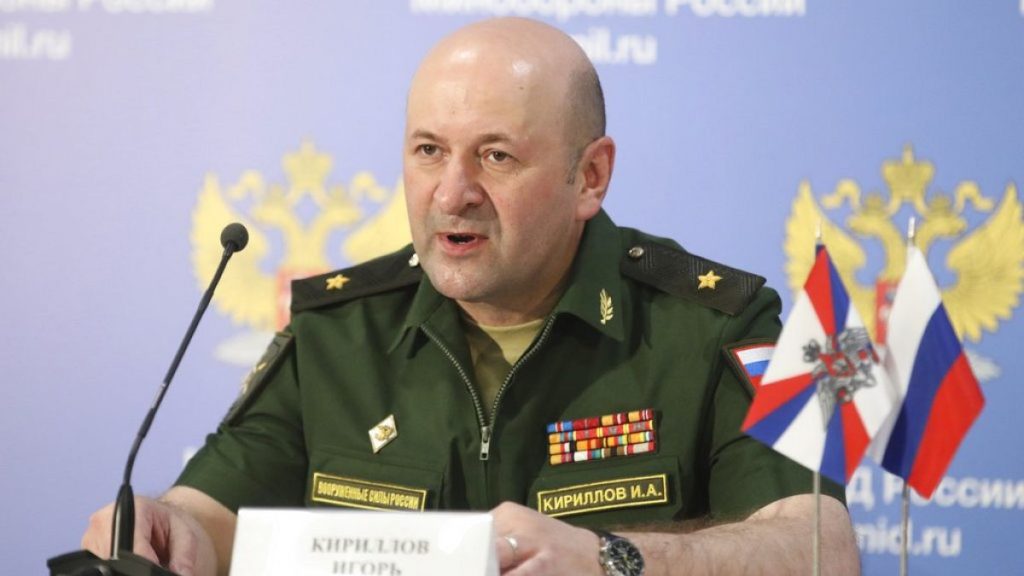The death of Lieutenant General Igor Kirillov, a prominent figure in the Russian military hierarchy responsible for radiation, chemical, and biological protection forces, has sent ripples through the international community. Kirillov’s demise, attributed to an explosion in Moscow, raises a multitude of questions surrounding the circumstances of his death and its potential implications for the ongoing conflict in Ukraine. The incident occurred just outside an apartment building on Ryazansky Prospekt, where Kirillov was found deceased alongside his assistant. Preliminary investigations by the Russian investigative committee indicate that the explosion was triggered by a device concealed within a scooter, suggesting a targeted attack rather than an accidental occurrence.
The timing of Kirillov’s death is particularly noteworthy, coinciding with reports of his in absentia sentencing by Ukrainian prosecutors for the alleged use of prohibited chemical weapons in the ongoing conflict. Just a day before the explosion, the Kyiv Post reported that Kirillov had been convicted by a Ukrainian court for his role in deploying chemical weapons during the war. This legal action further underscores the complex and contentious nature of the conflict, highlighting accusations of war crimes and violations of international law. Adding to the intrigue, Kirillov had also been sanctioned by the UK government in October for the transfer and use of chemical weapons in Ukraine, solidifying his position as a controversial figure in the international arena.
Kirillov’s death comes amidst heightened tensions and escalating accusations between Russia and Ukraine regarding the use of chemical weapons. Both sides have repeatedly accused each other of deploying such weapons, raising serious concerns about the potential for a wider and more devastating conflict. The use of chemical weapons is strictly prohibited under international law, and their deployment represents a grave violation of humanitarian principles. The accusations and counter-accusations surrounding their use in the Ukraine conflict further complicate the already intricate political landscape and add another layer of complexity to the ongoing war.
The investigation into Kirillov’s death is still in its preliminary stages, and numerous questions remain unanswered. The Russian investigative committee has initiated a criminal investigation to delve deeper into the circumstances surrounding the explosion and identify those responsible. Key questions revolve around the nature of the explosive device, the individuals or groups involved in planning and executing the attack, and the potential motives behind the assassination. The investigation will likely involve a thorough examination of the crime scene, forensic analysis of the explosive device, and interviews with potential witnesses. Unraveling the complexities surrounding Kirillov’s death is crucial for understanding the broader context of the incident and its potential implications for the ongoing conflict.
The implications of Kirillov’s death extend beyond the immediate investigation and raise broader questions about the future of the Ukraine conflict. His death removes a key figure in the Russian military hierarchy, potentially impacting the country’s strategies and operations related to radiation, chemical, and biological protection. Furthermore, the incident could exacerbate tensions between Russia and Ukraine, potentially leading to further escalations in the conflict. The international community will be closely monitoring the situation and the outcome of the investigation, seeking to prevent further deterioration of the already fragile peace and stability in the region.
As the investigation unfolds and more information emerges, the international community will be keenly observing the developments surrounding Kirillov’s death. The incident serves as a stark reminder of the volatile and unpredictable nature of the Ukraine conflict and the ongoing risks associated with the use of prohibited weapons. The pursuit of justice and accountability for those responsible is paramount, as is the need for continued diplomatic efforts to de-escalate tensions and prevent further bloodshed. The international community must work together to ensure that the principles of international law and humanitarian values are upheld, and that the conflict in Ukraine does not spiral into a wider and more devastating war.














